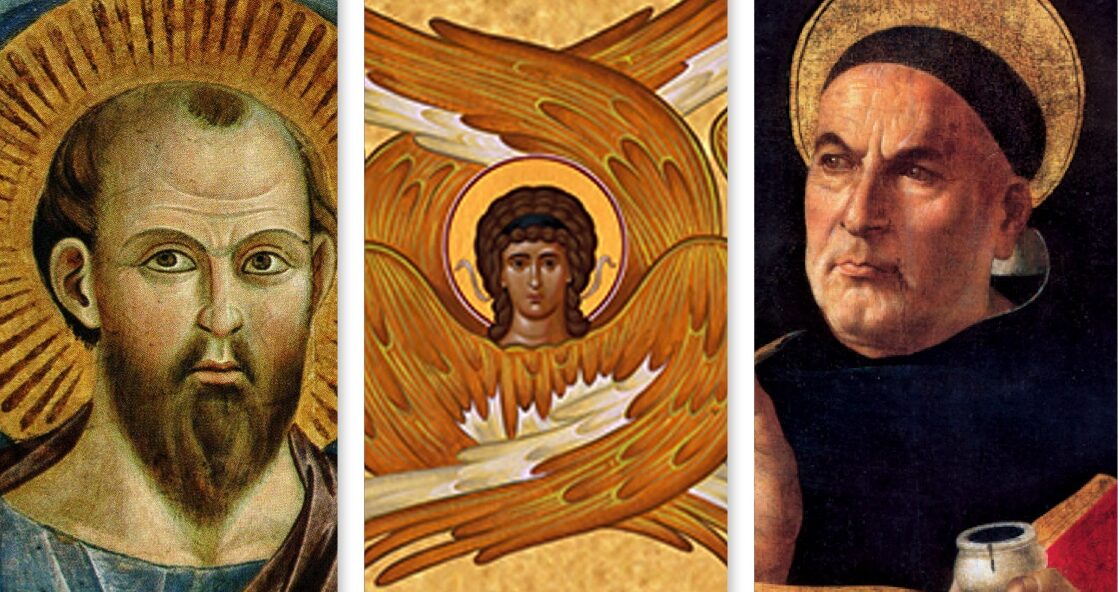Having come from the charismatic movement before being a traditional Catholic, I still talk to charismatic Catholics and admire some of them. Heavily influenced by the American Pentecostal (Protestant) movement, most charismatic Catholics today have a great devotion for the Apostle Paul. You can’t fault them for this.
In fact, besides the Blessed Virgin Mary, St. Paul is still my favorite saint. Thus, I want readers to see before continuing that there is clearly no problem in having tremendous devotion to the Apostle Paul (the Apostle as many later saints and Popes have dubbed him.)
But some charismatic Catholics today can be heard saying things like “I love St. Paul but I really don’t care for St. Thomas Aquinas.” Why do they say this? Usually, it is implied that while St. Paul was all about charity and evangelization, St. Thomas Aquinas approached God as a logical syllogism or a computer program. Because of St. Thomas’ sober approach to theology, he is often accused of being cold, unfeeling and objective. Thus, many charismatics dismiss him as a stick-in-the-mud when it comes to supernatural charity.
Or, they will cite the most over-quoted event of the life of St. Thomas. Most of you will recall how St. Thomas had a mystical vision of heaven and then stated that everything he wrote up to that point “was straw.” Of course, that event was awesome and true. But that event is also quoted out of context.
The truth of that mystical experience is this: While it is true that the Summa Theologiæ is “straw” when compared to the Beatific Vision (something Thomas admittedly did not attain while on earth—even in his mystical event) it is important to realize the Summa contains the Catholic faith which is required to attain the beatific vision. Thus, there is absolutely nothing contrary his mystical event and his Summa as many modernists imply.
Let’s return to the similarities between St. Paul and St. Thomas. This year I started reading the Summa for 15 minutes a day. At this rate, it will take me two years to finish. Now, keep in mind in the first paragraph of this article I wrote that my favorite saint (besides Mary) is St. Paul. And that is true. But as I read the Summa this year, I frequently compare St. Paul and St. Thomas. I repeatedly come to this conclusion: While their writing style and personalities were tremendously different from each other, there is nothing contrary in the assertions of two saints. At every step along the way of reading St. Paul and St. Thomas, I constantly see they were both Catholic priests promoting the same unchangeable Catholic faith.
One example of this is the theology of the angels. The angels surround us at all times, but we rarely think of them. Leftist “Catholics” see the angels as superstitious. Neo-con non-trad Catholics seem to believe in them, but speak of them as their pets to whom they give errands (eg “So, like, I told my guardian angel to make sure they had vanilla-pumps still at Starbucks before I drive all the way there in my yoga pants and slippers!”) But very few Catholics realize we are surrounded by terrifyingly-holy beings at all times.
In any case, the angels are real and there truly are nine choirs (conglomerations) of angels. Each choir has billions of angels in them. One reason we know this is not superstitious is because everyone from St. Paul to St. Thomas talks about angels in very similar ways.
In fact, St. Thomas quotes St. Paul directly to prove the different levels (choirs) of angels:
Each of these placings may claim authority from the words of the Apostle, who (Eph. 1:20,21) enumerates the middle orders, beginning from the lowest saying that “God set Him,” i.e. Christ, “on His right hand in the heavenly places above all Principality and Power, and Virtue, and Dominion.” Here he places “Virtues” between “Powers” and “Dominations,” according to the placing of Dionysius. Writing however to the Colossians (1:16), numbering the same orders from the highest, he says: “Whether Thrones, or Dominations, or Principalities, or Powers, all things were created by Him and in Him.” Here he places the “Principalities” between “Dominations” and “Powers,” as does also Gregory.—St. Thomas Aquinas, Summa Theologiæ, Part I, Question 108.
In conclusion, we see that Scripture is the inerrant word of God and it lines up perfectly with St. Thomas. St. Paul transmits this directly from the Holy Ghost. St. Thomas reflects this without sullying the Word. This is why I always insist that traditional Catholicism is really “Apostolic Catholicism.” I believe that with the exception of the tiny debates on speculative theology, we need to stop foisting opposition between the theology of the earliest saints with the medieval saints. St. Paul and St. Thomas would have agreed on 99.999% of their theologies. Thus, so should we if we wish to be Apostolic Catholics aiming for the beatific vision with the angels.
